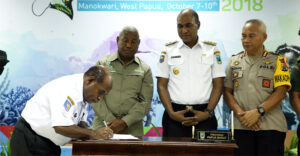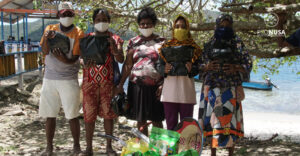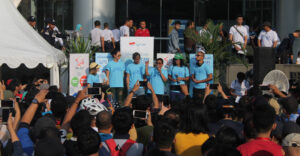
Kurabesi weighed the anchor in the northern sea of Meos Mansar Island in Raja Ampat Regency. Strong south stream made Kurabesi less likely to anchor at Yenbuba Village port. To reach the village, EcoNusa Covid-19 Response Raja Ampat team was carried by a speed boat.
From the speed boat, several homestays looked idle. The roofs made of nipa palm leaves seemed to be worn out.
The EcoNusa Covid-19 Response Raja Ampat team arrived at Yenbuba port at 9 a.m. Eastern Indonesia Time. The ironwood port stretched around 200 meters heading the village was behind the mountaineous areas of Meos Mansar Island.
At the village gate, there is a signage read “Tourism halted for the time being”. On the left side, an edifice with wooden wall stood there and it was a building for village-owned enterprise MART Meos Mansar. There was almost nothing inside the building as if left unattended for a long time. Only two small jars for candy and a few rolls of tissue.
Not far from the building, there was another building functioned as a booth for Covid-19. Flyers informing Covid-19, ship schedule from and to Waisai, and health protocol standard are pasted on the walls.
Nearly 70 percent of Yenbuba community relies their lives upon tourism. At the village, Samuel Wosparik, EcoNusa’s Program Officer, said that there are 20 homestays as the members of the Association of Business owners and Livelihood of Raja Ampat Community (Perjampat). Yenbuba is one of the islands in Raja Ampat with the most members of Perjampat.
“Actually, there are many more (homestay in Yenbuba Village). But those could hardly meet the criteria of Perjampat,” said Samuel.
Yacob Sauyai, the Yenbuba Village chief and chairman of Perjampat, shared his opinion to EcoNusa Covid-19 Response team.
“The pandemic made us go back to the jungle to cultivate a plot of land. We should be grateful as this could be a lesson learned. We keep moving for an adaptation,” he said.
Yacob emphasized this gratitude to 108 families in Yenbuba Village. As to him, island people is more fortunate than those who work in town. Now urban people cannot go out of their dwellings. They have money but feel depressed. Meanwhile, people dwelling in the island can go to the sea for fishing and to the garden to grow plants.
As the village chief, he needs to promptly make decisions. Many villagers are scared due to the spreading information. That is the reason behind the construction of Covid-19 booth while keeping campaigning the knowledge on Covid-19 transmission. The village authorities put their main concern to stay vigilant to the entry access of the area.
Yacob seriously stated, “We do not care whosoever is coming. But if we are not rigid, it will jeopardize the community.”
His statement was not baseless. Based on data from West Papua Covid-19 Task Force per 13 September 2020, there were 52 Covid-19 positive cases in Waisai, the capital of Raja Ampat Regency. This made him as a village chief worry due to the fact that many of his people went in and out of Waisai. The local authorities were prepared to impose lockdown policy to block outsiders of Yenbuba.
“Tourism remains a big question with an unclear end. But our need is so real. So we have to find a way out while staying alert,” Yacob stressed out.
Editor: Leo Wahyudi & V. Arnila Wulandani







